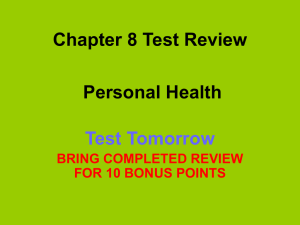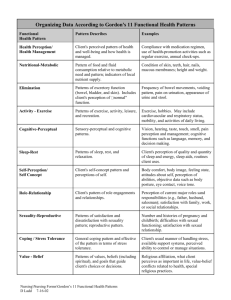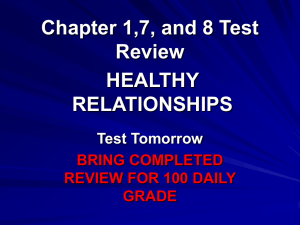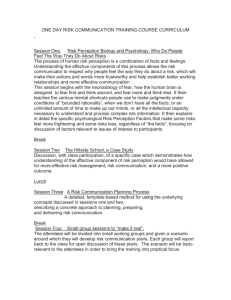Building Resilience to Stress Types of Stress
advertisement
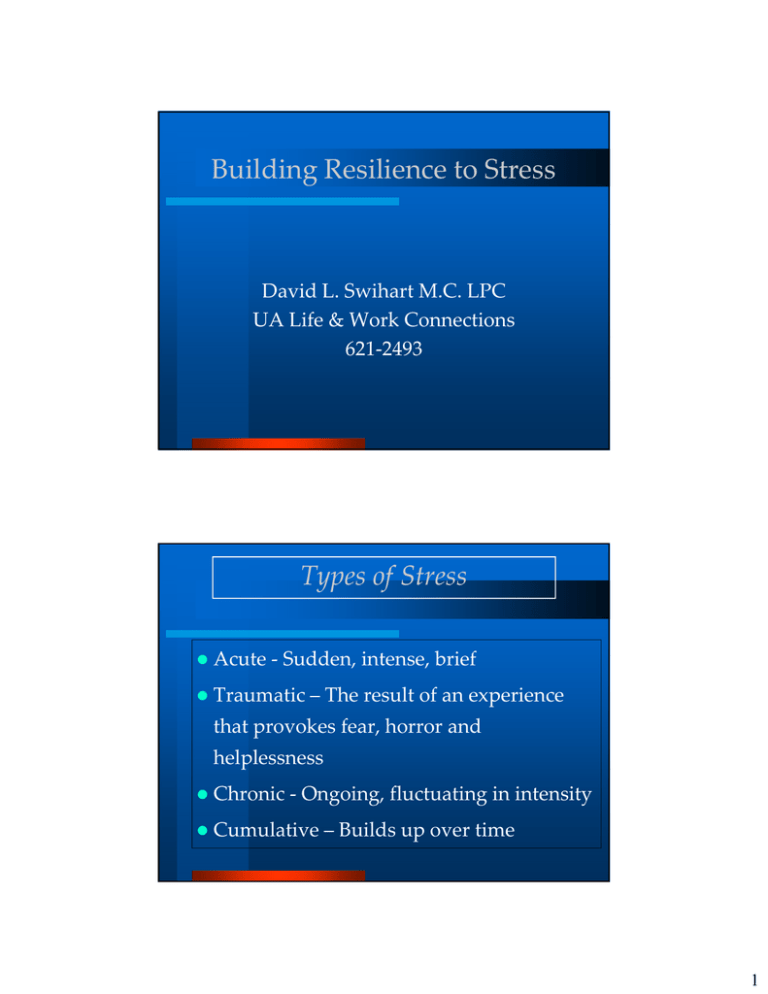
Building Resilience to Stress David L. Swihart M.C. LPC UA Life & Work Connections 621‐2493 Types of Stress Acute Sudden, intense, brief Acute ‐ Sudden intense brief Traumatic – The result of an experience that provokes fear, horror and p helplessness Chronic ‐ Ongoing, fluctuating in intensity Cumulative – Builds up over time 1 Normal Dendrites Dendrites Shortened due to Chronic Stress Source: McEwen, BS. www.cyberounds.com. Used by permission. The above images demonstrate a comparison of a clinically depressed patient (right) compared to a matched control (left). In the color scheme, blue represents less activity (glucose metabolism) while red represents more (glucose metabolism). Source: http://www.musc.edu/psychiatry/fnrd/petdep.htm (Medical University of South Carolina). Used by permission. 2 Stress: Immediate Effects Ischemic pts: 2x increase in risk for MI Ischemic pts: 2x increase in risk for MI within 1 hour “Mental stress” induced ischemia associated with vascular resistance Exercise induced ischemia NOT associated with vascular resistance. (Cacciapo, Tassmory & Bernstein, 2000) Chronic Stress: Effects Risk (2x) for Metabolic Syndrome Risk (2x) for Metabolic Syndrome (Chandola, et (Chandola et al., 2006) Hypertension : +15/+7 in “unfair” working conditions. +10/+5 assoc. 16% CHD risk, 38% Stroke risk (Wager, et al., 2003) Coping Ability can alter risk for CVD p g y ((Keltikangas‐ g Jarvinen, et al, 2001) 3 Anger Above median hostility => 9.5 x more Above median hostility > 9 5 x more likely to have Ca score 20+ (ages 18‐30) (Iribarren, et al., 2000) Trait anger => (normotensive) 2.2 x higher risk CHD (hypertensive) No Dif higher risk CHD, (hypertensive) No Dif (Williams, et al., 2000) Depression 11.6 x higher risk for development of 6 x higher risk for development of CHD. (Anda et al, 1993) Post‐MI depression increases risk of death 4.1 x (Bush, et al., 2001) 4 Sleep Problems Insomnia – Hard to get to sleep – Hard to get back to sleep Disrupted sleep – Poor quality of sleep q y p Productivity Cost: ~$2‐3,000/emp/year LONG-TERM HEALTH CONSEQUENCES Heart Disease High g Blood Pressure Insulin Resistance Suppressed Immune System - infections Hyper Immune Response - autoimmune disorders Ulcers, GERD, IBS Osteoporosis Diabetes Rheumatoid Arthritis Neuron Death & Brain Shrinkage 5 Social Support Social Support Social Support – Protective factor – Alters perception of approaching stressors Supportive Supervisors & Organizations – Work‐family conflict (Goff, Mount, & Jamison, 1990 J 1990;Jones & Butler, 1980). & B tl 1980) – Employee job satisfaction (Parasuraman et al., 1992), – Organizational commitment (Scandura &Lankau, 1993). HOW FAT IS YOUR MARGIN? Margin: Your moment by moment ability to cope with a new stressor 6 Exercise: Manifestations of Stress Physical Cognitive Psychological/Emotional y g Spiritual Stress Response Process Stressors Perception of stressor Physical Responses Behavioral Responses Health Outcomes 7 Our Perceptions of Life E Events... t Determine Our Emotional Responses Perception: Added Meaning Meaning associated with Meaning associated with stressor event Built historically Meanings can be Changed Ask “Dumb” Questions – Why… 8 Common Perceptions? Resilience Identify (Mis)Perception Identify (Mis)Perception Work to Change Your Perception 9 Characteristics of Resiliency Playful Childlike Curiosity Playful, Childlike Curiosity – – – – – – Asks lots of questions; Wants to know how things work; Plays with new developments; Makes mistakes Learns from experience Trusts intuition and hunches Characteristics of Resiliency Mentally and Emotionally Flexible – Comfortable with contradictory personality qualities, (e.g., Strong vs. Gentle, Logical vs. Intuitive, Calm vs. Emotional) – Has Good Friendships, Loving Relationships – Can Have Feelings w/o Feelings Having Them – Reads Others with Empathy 10 Characteristics of Resiliency Has Solid Self‐Esteem and Self‐Confidence – Self‐Confidence = Reputation with yourself – Expects Things to Work Out Well • “Its just a problem to be solved” – Defends Self Well • Avoids/Blocks Attacks • Sees Through Cons • Sidesteps Games Characteristics of Resiliency Positive Emotion and Laughter Positive Emotion and Laughter – – – – Humor Gratitude Interest Love 11 Characteristics of Resiliency Hardiness – The commitment to find meaningful purpose in life; – The belief in one’s ability to influence surroundings or outcomes; – The belief that one can grow and learn Th b li f h dl from both positive and negative experiences. Bonnano (2004), Siebert (2003) 12
